Jacqueline Cofield is a multidisciplinary arts consultant, cultural entrepreneur, educator, and filmmaker with 20+ years international exposure. Cofield has traveled to nearly 50 countries, resided in seven, and is trilingual. She earned Masters degrees from both the University of Southern California and The City College of New York, and a bachelor's from NYU's Tisch School of the Art. Cofield founded J Rêve International in 2012, producing international multidisciplinary arts, educational, and multimedia projects. Learn more at www.jreveinternational.com
What motivated your decision to go abroad? How/why did you choose where to go?
I grew up in a small town just outside of Rochester, NY called Penfield. My parents exposed my sisters and I to travel in the US at an early age; we went to Louisiana, where my father is from, every summer. These trips interested me in further travel. And movies. I loved watching movies that depicted places I'd never been. My interest in international travel grew even more when I began to study Spanish in middle school. My parents registered my sister Raquel and I in a study abroad program in Cuernavaca, Mexico. The program was really designed for students attending the local college where my father worked. That was my first study abroad experience. We spent the summer studying and living with a Mexican host family who barely spoke English, and my life was forever changed. I remember initially being nervous because I was the youngest in the cohort. Once I was there, however, I met other students my age from Exeter prepreparatory school, and I knew then that I, too, could handle the experience. When summer was over, I wanted to stay, and I couldn't wait to travel again. Today, I have traveled to 50 countries and lived in 7: Mexico, Venezuela, Czech Republic, France, Italy, China, and Senegal.
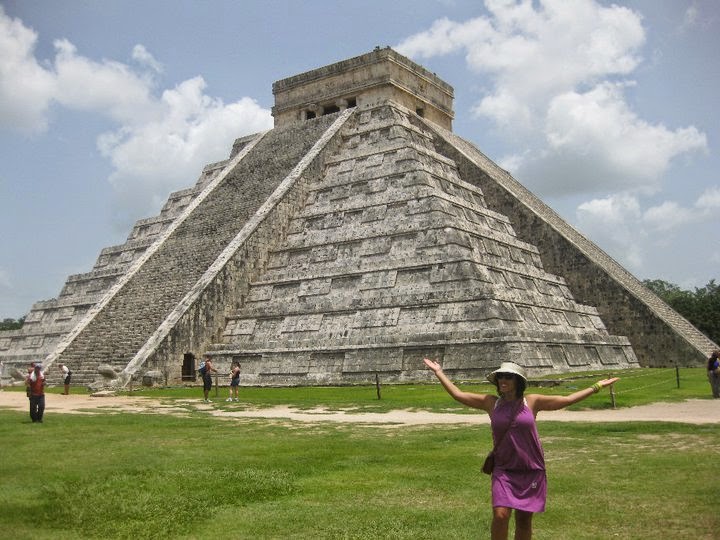
What was your experience like? What is your favorite memory? What were some challenges you observed?
Cultural immersion is exquisite. It is a challenge on many levels, and the rewards are immeasurable. The first day of school in Mexico, I needed an iron and couldn't remember the word in Spanish. I had to do a sort of charades until it was understood what I was asking for. "Oh la plancha!" The family exulted. I have never forgotten that word because of the context how I learned it. Interactive learning is powerful and memorable. I have so many experiences like that, where I struggled for vocabulary acquisition and retention. Learning a language is a practice of humility. You are going to make mistakes, and once you accept that fact, you are free to learn, especially by trial and error. The element of surprise is a constant; you are consistently exposed to cultural differences, and I find that quite stimulating. I truly enjoy learning about other cultures. In the end, you realize how we as humans are significantly similar and also interconnected. Smiling when we can't otherwise communicate using words is among my fondest memories.
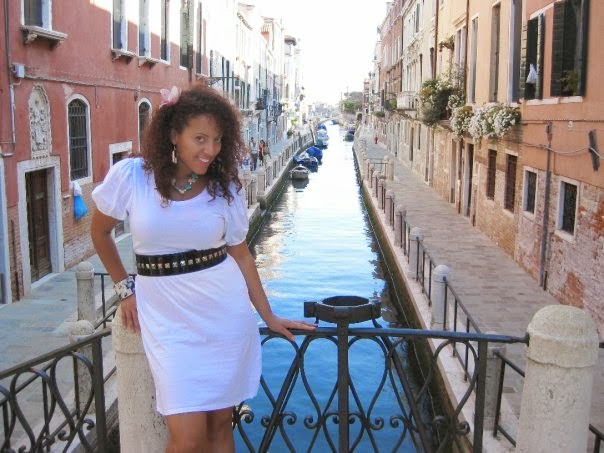
What skills did you develop from your experience? Do you feel changed from your experience abroad?
It may be difficult to quantify the skills I gained through international travel over the years, but I can approach this task.
Empathy is one: Experiencing the synchronicity of humanity is touching and can shift one's perspective such that they are forever impacted with a sensibility, concern and understanding for all people.
Polylingualism: I am fluent in French and Spanish, can speak basic Italian, am studying Portuguese, and can say basic introductions and comments in Wolof, Russian, Mandarin, German, Czech, Thai and Japanese. Mastery of a language, in my experience, only happens when one is immersed.
I am definitely impacted or changed by my global experiences. They are an important fabric now of my identity. If you know me, you know that I am a global citizen, trilingual, and an active interculturalist. I connect well with people from all over the world, perhaps quicker than others might, largely because of my global exposure.
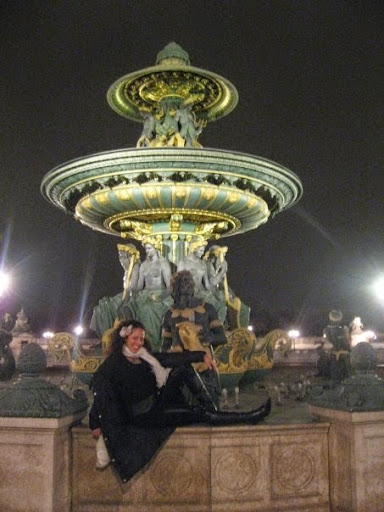
Has your experience helped you get to where you are today?
Definitely! Absolutely! I could not have launched an arts program in Senegal if I didn't speak French fluently. I would not have been selected for many opportunities if I didn't have language skills and international experiences. And, perhaps I wouldn't be creating similar experiences for others if I hadn't. Additionally, I know people literally all over the world, so another way my experiences continue to impact me is related to social capital, or the value of relationships. Travel has raised my consciousness of global issues, and much of the work I am involved in today is directly related to this awareness. I founded my company, J Rêve International, in 2012 and have launched a number of international programs, such as a global artist residency program. I am also a filmmaker and shot projects in countries like Mozambique, France, Senegal, and England.
What advice would you share with other students who are thinking of going abroad?
I could write a book on this subject, but some pointers stand out:
If you make travel a priority, it can be yours for a lifetime.
Show, don't tell, about your desire to travel.
The compound effect of small decisions over time can make these dreams a reality, no matter your circumstances.
Save your money.
Research organizations who sponsor study abroad. For example, I am a Rotary scholar alumni. When I studied abroad in Venezuela, the Rotary Club of Penfield, NY sponsored everything: my flight, studies, homestay, and even afforded me spending money. When I was a college student at NYU, I received scholarships to study abroad in Paris and Prague from the NYU study abroad office, the Urban League, and because of my good grades I was a Marthin Luther King Scholar, and invited to travel to Senegal for the first time. While a graduate student at USC, I spent a semester working at the Peggy Guggenheim museum in Italy, while working on my thesis research.
That brings me to the next point. You have to study. You have to practice; to learn a language you need not only vocabulary: you need to speak, and often. There are free conversation exchange organizers online that provide access to speaking partners all over the world, so you can practice speaking any language.
And another important point I'd like to share is don't get lost in comparisons. Take a step back and just learn. Relish in shifting paradigms, perspectives, points of view, ways of doing things.
Travel with an open mind and heart with the intention to elevate your mind to a higher consciousness, awareness, or understanding.
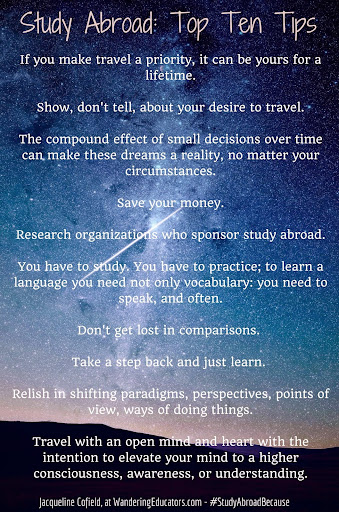
How has international education impacted or influenced your cultural identity?
That's an interesting question, indeed. When you travel, you realize the natural tendency of humans to classify, to categorize, to group. Depending on the situation, you can become very aware of your age, your gender, your nationality, your ethnicity, your tastebuds, and all of your senses.
When you travel internationally, in some respects you are a global ambassador for your country, your school, your company, or with whom or whatever you are associated. I am seen as racially ambiguous, meaning people are often curious about my ethnicity, as physically I can blend in in many places. At the end of the day, culturally, I am American, and yet I am a global citizen, and those of us who make such a statement share a culture of genuine internationalism that is a part of our identity. I can be at home at home, or away from home because of my varied and consistent global exposure and international education.
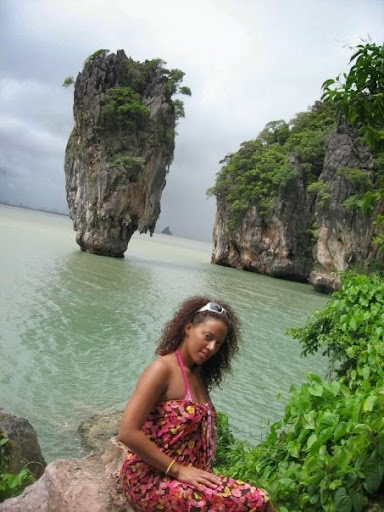
Is there anything else you'd like to share with us?
Travel has significantly impacted my life, and one of my personal and professional missions is to get people traveling whether it be exposing them to the arts of another culture, depicting a range of global places in film, or literally arranging for them to travel abroad. I have organized trips for art collectors to travel to Egypt and China, artists to travel to Europe, Africa, North and South America, and currently I am organizing a trip for educators to travel to Senegal in April. As an educator myself, I not only appreciate the work teachers do, but know the impact they have on students. When teachers travel, their students ultimately benefit from these global experiences.
#studyabroadbecause it changes your life
#studyabroadbecause you will have a global family
#studyabroadbecause it is the best way to learn a language
#studyabroadbecause you create the life you live
#studyabroadbecause you want to be a global citizen
#studyabroadbecause it impacts your career
#studyabroadbecause you want to learn about the world

All photos courtesy and copyright Jacqueline Cofield
